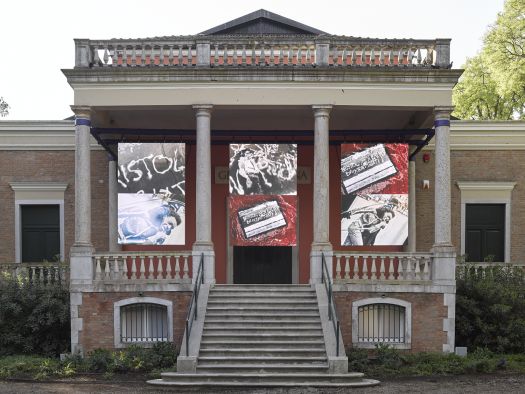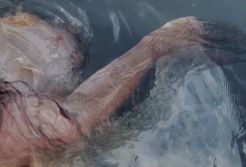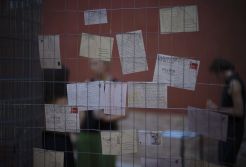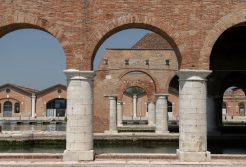The 60th International Art Exhibition – La Biennale di Venezia in 2024
27 August 2024
MA Contemporary Curating student Mila Januszova awarded prestigious British Council Venice Fellowships by British Council...
The Venice Fellowships programme is a unique opportunity for students to spend a month to fulfil their international ambitions in developing their practice and curatorial skills internationally in Venice during the world’s most important art event. The Fellowship also aims to support students to explore how to work internationally while providing them with a platform to engage with the Venice Biennale to research and develop new connections with curators, critics, artists, and professionals working cross the UK and internationally.
Manchester School of Art is a partner institution in the British Council’s Venice Fellowships programme. This distinctive Fellowships opportunity offers the Fellows to have the chance to conduct their independent research in and around Venice and enhance their current studies and professional practice alongside other creative students and professionals from 40 UK Higher Education Institutions.
Mila joined us in this interview to talk about her residency experience as well as her academic experience with her studies, conducted by Dr Gulsen Bal, Programme Leader in MA Contemporary Curating
Gulsen: Could you please tell us about yourself and your experience with your academic studies on the MA Contemporary Curating programme at Manchester School of Art?
Mila: I was born in Poland and initially embarked on my academic journey studying for a BA in Fashion in the south of England. However, my path took an unexpected turn when I volunteered at an art exhibition organised by FiLiA. This experience sparked a realisation of my true passion lay in the fine arts and contemporary art world, particularly in organising and curating events and exhibitions.
Motivated by this newfound interest, I switched my focus and completed a BA in Fine Art and Curating. It was during this time, in my third year, that I met you, Gulsen. Your insights into contemporary curatorial discourse and the representation of women in the arts as curators profoundly influenced me and solidified my ambition to pursue this field further.
After graduating, I took a year off to reflect on my next steps. I recognised the need to deepen my understanding of the theoretical aspects of curating and to explore the various discourses within contemporary curating to build my professional confidence. This led me to the MA Contemporary Curating programme at Manchester School of Art.
Before I started my MA studies, I participated in the Graduate Internship Scheme, working as an Exhibition and Events Coordinator at the Manchester Poetry Library. This role allowed me to apply my academic knowledge practically and helped me discover my interest in visual poetry as contemporary art. It also helped me to discover my interest in redefining cultural curatorial practices, an area I wouldn’t have acknowledged without the support of my academic background and tutor.
Inspired by these experiences, I sought to maximise my learning opportunities. I applied for the Videocity internship and the Fellowship Program, aiming to broaden and develop my curatorial skills and knowledge on an international scale. These opportunities have further enriched my understanding and practice of contemporary curating, enabling me to pursue my goals with greater confidence and expertise.
Gulsen: Candidates are selected through a competitive application process… So, can you tell us about your research project and what motivated you to apply to this specific international Fellowship?
Mila: My research project changed from looking at people and the stories of individuals navigating these transitional spaces to instead around the relationship between nature and cultural identity. , “Liminal Echoes: Visual Poetry in the Ecological Tapestry of Venice,” explores the profound interplay between human experience and the natural world within the unique context of Venice. My project investigates how the erosion and evolution of Venice’s ecological landscape shape the cultural identity of its inhabitants. Through photographic portraits, audio narratives, and visual poetry workshops, I aim to capture and express the intricate relationship between cultural transitions and ecological changes in this iconic city.
Upon arriving in Venice, I was immediately captivated by the natural environment—the city on water, the omnipresent natural erosion, and the seamless integration of nature and culture. This inspiration led to a refinement of my project to focus more closely on how these ecological elements influence the lived experiences and cultural expressions of Venetians. Additionally, I had the opportunity to host cyanotype workshops at the British Pavilion, merging traditional photographic techniques with contemporary visual poetry to further explore and document these themes.

The motivation to apply for this specific international Fellowship stems from several key factors:
Unique Opportunity for Project Development: The Fellowship offers an unparalleled opportunity to develop my project in a culturally and historically rich environment. Being in Venice allows me to engage directly with the city’s unique ecological and cultural landscape, providing invaluable insights and inspiration for my research.
Networking with Esteemed Artists and Curators: The chance to meet renowned artist John Akomfrah and especially curator Tarini Malik is incredibly inspiring. Networking with such influential figures, particularly inspirational female curators, presents a valuable opportunity to gain insights, receive feedback, and build connections that can enrich my project and future career.
Global and International Exposure: The international aspect of this Fellowship is incredibly appealing. Engaging with a global community of artists and curators provides a broader perspective on contemporary art practices and enhances the collaborative potential of my project. This exposure to diverse viewpoints and practices is invaluable for my growth as an artist and curator.
Commitment to Diversity and Inclusion: The program’s commitment to fostering a diverse and inclusive community aligns perfectly with my own values and goals. The emphasis on developing skills, promoting cultural awareness, and addressing real-world issues through art is particularly compelling.
Personal and Professional Growth: The hands-on approach and immersive experience provided by the Fellowship present an ideal environment for both personal and professional development. The opportunity to contribute to and benefit from a vibrant international artistic community is invaluable.
A Milestone in My Recovery Journey: Applying for and being selected for this Fellowship is a particularly proud moment in my recovery journey. After battling mental health issues and recovering from spinal surgery, returning to my studies and being able to actively participate in this prestigious program is a testament to my resilience and determination. This opportunity signifies a significant achievement in my ongoing journey of recovery and professional growth.
Post-Fellowship Impact: Upon returning to the UK, I plan to share the outcomes of “Liminal Echoes” through a curated exhibition at PINK, digital documentation, and collaborative publications. This will extend the project’s reach and foster broader discussions on cultural fluidity and the role of visual poetry in contemporary art.
Overall, this Fellowship represents a unique and transformative opportunity to deepen my understanding of the interconnectedness of cultural identity and ecological landscapes while contributing to an inclusive and dynamic international artistic community.
Gulsen: What are the benefits of spending a month in Venice during the world’s most important art event and what did you hope to achieve through this unique fellowship opportunity?
Mila: Spending a month in Venice during the Venice Biennale, widely regarded as the world’s most important art event, offers an immersive and transformative experience for artists and cultural enthusiasts alike. The sheer magnitude and diversity of artistic expression showcased throughout the city during this time provide an unparalleled opportunity for creative enrichment and inspiration. Immersing oneself in the vibrant atmosphere of the Biennale allows for exposure to a vast array of artistic styles, mediums, and cultural perspectives, fostering a deeper understanding of contemporary art trends and practices. Moreover, the Venice Biennale serves as a global stage for artists and cultural practitioners to showcase their work, offering invaluable visibility and recognition on an international scale. As a fellow participating in this prestigious event, my goal was to absorb the wealth of artistic stimuli surrounding me, engage in meaningful dialogues with fellow artists and curators, and gain insights that would inform and enrich my own artistic practice and curatorial endeavours.
Additionally, I sought to establish connections and forge collaborations with like-minded individuals within the global art community, laying the groundwork for future projects and initiatives that transcend geographical and cultural boundaries. Overall, the Venice Biennale fellowship presented a unique opportunity for personal and professional growth, allowing me to expand my artistic horizons, deepen my appreciation for contemporary art, and contribute to the rich tapestry of cultural exchange and dialogue that defines this iconic event.
Gulsen: Has this been a formative and inspirational experience? Also, how has this impacted on your curatorial thinking?
Mila: Participating in the Venice Biennale fellowship has indeed been a formative and inspirational experience, one that has left an indelible mark on my curatorial journey. Immersing myself in the vibrant atmosphere of the Biennale and engaging with a diverse array of artworks, exhibitions, and cultural events has expanded my artistic horizons and challenged my preconceived notions about curatorial practice. Witnessing the sheer diversity of artistic expressions and the myriad ways in which artists engage with contemporary issues has been both humbling and invigorating. This experience has broadened my understanding of the role of the curator as a facilitator of dialogue, a catalyst for change, and a steward of cultural heritage. It has encouraged me to embrace experimentation, to push boundaries, and to advocate for inclusivity and diversity in my curatorial endeavours. Overall, the Venice Biennale fellowship has profoundly impacted my curatorial thinking, instilling in me a renewed sense of purpose and passion for the transformative power of art.



